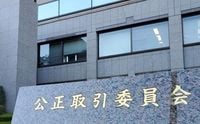On May 8, 2025, Japan's Fair Trade Commission (FTC) issued a stern warning to 15 high-end hotel companies operating in Tokyo, including prominent names like Imperial Hotel Tokyo, Hotel New Otani, and The Okura TOKYO. The warning comes amidst rising concerns about potential violations of the Antimonopoly Act due to the exchange of sensitive pricing information that could lead to cartel-like behavior in the hospitality industry.
The FTC's investigation revealed that these hotels had been sharing non-public information related to management strategies. This included key metrics such as occupancy rates, average room rates, revenue per available room, and future reservation statuses. Such exchanges were reportedly conducted during regular meetings known as the "FR (Front Reservation) Association," held monthly in banquet halls and conference rooms across various hotels.
According to the FTC, the purpose of these meetings was ostensibly to discuss operational strategies, but the nature of the shared information raised red flags about potential collusion. "For instance, if a hotel learns about a competitor's reservation status, it might decide not to lower its prices, believing that demand will remain strong," an FTC official noted, highlighting how this could distort fair competition.
The FR Association has been in operation for several decades, and the FTC believes that the sharing of sensitive internal information has been occurring for at least a few years. Meetings have not been held since last fall, as several companies have already withdrawn from the association amid growing scrutiny.
In light of the ongoing surge in hotel prices, driven by a boom in inbound tourism following the COVID-19 pandemic, the FTC opted for a warning rather than a full-blown investigation. The commission noted that lodging rates in Tokyo have been soaring, with some hotel operators reporting average room rates that have increased by as much as 1.6 times compared to the previous year. This trend is expected to continue, particularly with major events like the Osaka-Kansai Expo drawing even more visitors to Japan.
In a statement, Imperial Hotel and other involved companies expressed their commitment to compliance, stating, "We sincerely accept the warning and will thoroughly ensure compliance with laws and regulations." This response reflects an acknowledgment of the FTC's concerns and a willingness to restore public trust.
The FTC's warning is part of a broader effort to curb potential price-fixing practices that could arise in the hospitality sector. The commission has also reached out to industry associations, including the Japan Hotel Association and the All Japan Hotel Federation, urging them to disseminate the warning's content to their members to prevent any further violations.
As the hospitality industry continues to rebound, the FTC's vigilance is critical. With projections from travel giant JTB estimating that 40.2 million foreign visitors will arrive in Japan in 2025, the potential for inflated prices looms large. This situation necessitates transparency and fair competition to ensure that consumers are not adversely affected by any collusive practices.
The FTC's actions serve as a reminder that even established and reputable companies must adhere to fair competition laws. The exchange of sensitive pricing information, even if done under the guise of operational cooperation, can have serious implications for market dynamics and consumer trust.
As the situation develops, stakeholders in the hotel industry will be closely monitoring the FTC's recommendations. The need to balance profitability with ethical business practices has never been more pressing, particularly in an era where consumer scrutiny is heightened.
In conclusion, the FTC's warning to Tokyo's high-end hotels underscores the importance of maintaining competitive integrity in the hospitality sector. As the industry navigates post-pandemic recovery, ensuring compliance with antitrust regulations will be vital in fostering a fair marketplace for both businesses and consumers alike.







